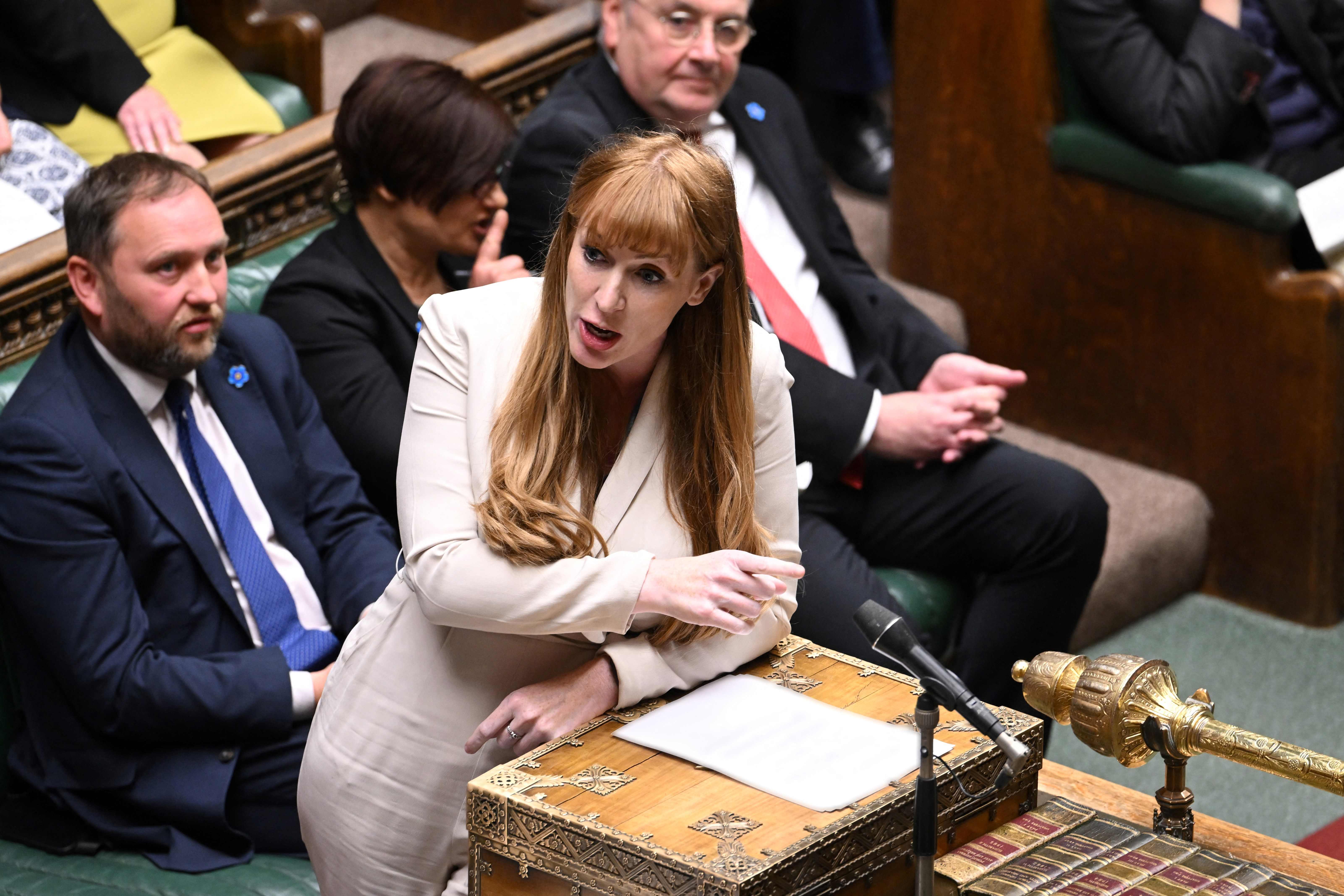Do the allegations about Angela Rayner’s tax affairs have any merit?
As the fuss about the Labour Party’s deputy leader and her house sale rumbles on, Sean O’Grady looks at the facts behind the story, and what it could mean for Labour


Angela Rayner, the deputy leader of the Labour Party, has been accused, variously, of evading tax, avoiding tax, lying, and misleading the public as well as her party leader about her tax affairs. The allegations arise from a book by Michael Ashcroft, a former deputy chair of the Tory party and no stranger to tax-based controversies himself.
In Red Queen? The Unauthorised Biography of Angela Rayner, Ashcroft alleges that, long before she was an MP, she bought her former council house, in Vicarage Road in Stockport, with a 25 per cent “right to buy” discount. In due course, she got married and cohabited with Mark Rayner, and she sold the house in 2015 at a gross profit of £48,000.
Ashcroft used information from the electoral register, Rayner’s marriage certificate, and the address given on the birth certificates of her children in his research, but the evidence is inconclusive, and even if it were possible to establish where she and her husband/partner were living at various points, it may be irrelevant from a tax liability perspective. The great irony may be that both Rayner and Ashcroft are misunderstanding the regulations relating to capital gains tax (CGT), albeit in their own different ways.
What happened?
It’s complicated. The former Angela Bowen lived with Mark Rayner, and married him in 2010, and they had two children. They were divorced by 2020. Each had a home of their own, and during the course of their lives together spent different periods of time living at different locations. Some, but not all, of Rayner’s private life is relevant to her tax liabilities before she became a politician, and to the questions she is facing now.
So does she owe any tax?
Again, it’s complicated. The main thing to say is that no one, possibly including Rayner herself, knows. When a couple gets together, they have to designate to HMRC one of their addresses as their main residence for tax purposes, almost irrespective of their living arrangements. It doesn’t have to be their home in the colloquial sense.
Crucially, we do not know if the address chosen was Mark or Angela’s. If they didn’t choose one, then it would default to where they actually lived, and we don’t know for sure where they lived at any given time. The addresses supplied for the birth certificates and marriage register don’t tell us that much, either.
We don’t know what Mark Rayner paid for his home, and we don’t know what Angela Rayner spent on home improvements and other legitimate expenses to offset tax on her place. If Angela Rayner did fail to pay the right amount of tax, that is not necessarily a criminal offence. All of this, and more, is laid out in a detailed blog by the estimable Dan Neidle of Tax Policy Associates, a respected expert.
What does Rayner say?
That’s complicated, too. She’s said various things in her defence, not all entirely consistent. First, that she’s done nothing wrong. Second, despite that, that she was a care worker who just sold her home like anyone else would – implying, arguably, that she was not aware of the Byzantine HMRC rules about designating residencies when couples get together. Third, that she’s subsequently had tax advice that assures her she owes nothing.

On top of all this, a Labour Party spokesperson has said the following: “Angela and her husband mutually decided to maintain their existing residences to reflect their family’s circumstances and they shared childcare responsibilities. Angela has always made clear she also spent time at her husband’s property when they had children and got married. She was perfectly entitled to do so.”
Why won’t she publish the expert advice she’s received?
Her attitude is “Why should I?” Her tax affairs are private, like anyone else’s, and the evidence that she’s broken the rules and owes the taxman money – and that isn’t necessarily a crime, anyway – is not so overwhelmingly conclusive, as far as we know, as to have attracted the attention of HMRC inspectors. The police, apparently, were satisfied that no criminal actions had taken place.
It is worth remembering that messing up a tax return and underpaying amounts due is not necessarily a criminal offence. If it were, then the crime rate would be far higher.
Cheekily, Rayner has said she will make her tax affairs public if her Conservative critics will do the same. There has been a shuddering silence in reponse to Rayner’s challenge to “show me yours and I’ll show you mine”. Her defiance in the face of media pressure, wise or not, is impressive.
Should she?
Superficially, it might be the easiest thing to do, and would clear up any misunderstandings, quell nasty rumours, and remove the charge of “hypocrisy” – one of the most serious offences in the British media’s moral code, only a couple of steps down from homicide.
In reality, it might present more questions than it answers, and her enemies would probably find some tax expert or lawyer (or charlatan) to rubbish the advice she was given (insofar as it exists). Of course, the “advice” she was offered might be conditional, or incredible, or seem so flimsy as to be unbelievable; but that in itself doesn’t mean she’s in trouble, either. In the end, the only opinion that matters is that of HM Inspector of Taxes, and if they’re saying nowt, then the the saga is stalled.
Where does Keir Starmer fit in?
It’s a bit complicated. The normal thing would surely be for Starmer to discuss the situation with his deputy, and as part of that discussion, he’d take a look at the much-vaunted legal advice. After all, as a former director of public prosecutions, he knows a thing or two about evidence for the defence. It is odd, to say the least, that he has chosen not to review the advice, assuming it is in documentary form.

“I don’t need to see the legal advice. My team has seen it,” he said. In all fairness, that does feel very much like a device to put a small but crucial distance between himself and Rayner. That’s not helpful to her, but it could be worse.
At this stage in the electoral cycle, Starmer won’t want to lose her, with all the political fallout that would follow. Given she is an elected official, he cannot fire her anyway; and if she had to quit, there would have to be an election for the deputy leadership. That would involve the unions and the entire party membership, and Starmer might be lumbered with someone from the left much less palatable to him than Rayner.
If there were to be a demotion for Rayner, it would probably be just from the shadow cabinet, and there are multiple precedents on all sides for people to come back into government after a suitable period of penance. But for now, provided HMRC takes no action, Rayner is extremely secure.
Why hasn’t the story really taken off?
The sheer complexity of the rules is a big part of it; the evidence available is not conclusive, and so there isn’t that much for the rest of the media to go on. Even if there were, attacks from wealthy Tory politicians and print titles owned by billionaires with their own tax-efficient arrangements just aren’t as effective as they might be, because the loosely defined charge of “hypocrisy” runs both ways.
So the Tories know that an argument about whatever tax Rayner might owe – which could amount to nothing, or be around £1,500 to £3,500, tops – looks trivial compared with the sums that have so often made the headlines in regard to Conservative politicians.
The leaked Paradise Papers some years ago, for example, show that, between 2000 and 2010, Ashcroft himself received payments of around $200m (£158m) from his perfectly lawful offshore trust in Bermuda. The Tory peer continued to sit in the House of Lords, and, as a non-dom, he did not have to pay tax on these payments, despite claims previously made by the then leader, William Hague, that he would do so – and, in Hague’s words, “benefit the Treasury tens of millions of pounds a year in tax”.
Ashcroft’s spokesperson added that he had never engaged in tax evasion, abusive tax avoidance or tax avoidance using artificial structures. Still not a good look, though.

Defenders of Rayner also point, to name some examples, to the lucrative non-dom status (now rescinded) enjoyed by the prime minister’s wife, Akshata Murty, who is worth around £800m; to the seven flats owned by the chancellor, Jeremy Hunt, which he failed to declare promptly in the MPs’ register of interests; to the lavish rental expenses claimed by certain married Tory MPs; and to the millions of pounds in CGT that former chancellor Nadhim Zahawi was accused of avoiding. Glass houses and all that...
So can the Conservatives push #Raynergate for electoral purposes?
To an extent, but there’s a certain amount of embarrassment on their own side about tax stuff, so it’s not yet a major political battlefield: the NHS and immigration are more potent talking points. Basically, the public don’t seem that bothered about it – perhaps because they too are bewildered about CGT, and thus have some sympathy for Rayner, and less for the super-rich people attacking her. Some may even regard it as a sort of bullying, while those who are offended by Rayner’s behaviour are unlikely to vote Labour anyway.
Aside from a jokey reference in Hunt’s last Budget speech, the Tories aren’t hammering it, mostly allowing parts of the media to make the running. That said, the current Tory chair, Richard Holden MP, has chosen to target Starmer rather than Rayner and is making accusations about Rayner’s entries on the electoral register as well as the tax side of things. Holden is asking the Labour leader the following questions:
- Do you still believe that there has been no wrongdoing?
- Do you believe Ms Rayner’s contemporary version of events or Ms Rayner’s social media posts from the time? The two are in direct contradiction.
- Ms Rayner has claimed she received legal advice. You have stated you have not seen this advice and even believe it would not be “appropriate” to see it. Do you still maintain that it would not be appropriate to see the advice she claims to have received?
- Would it be acceptable for the individual responsible for your party’s policies on housing and elections to deliberately provide false information to the electoral registration officer?
Where’s it going?
It feels very much like the “currygate” scandal during the pandemic, which some newspapers “splashed” on for days on end with no lasting impact. Prompted, coincidentally, by Holden as a Durham MP, the local constabulary twice examined whether Starmer’s presence at a meal with Labour Party workers constituted a breach of the lockdown rules at the time.
Despite a fuzzy photo proving his presence and a plausible case, the police twice decided to do nothing, no fixed penalty notice was issued, and Starmer didn’t have to carry out the promise he made to quit if that happened. Perhaps Rayner might now make a similar promise to protect herself – it would be a bold move, but a risky one.
Join our commenting forum
Join thought-provoking conversations, follow other Independent readers and see their replies
Comments
Bookmark popover
Removed from bookmarks